-
Depositing Lab
-
Publication
-
Sequence Information
Ordering
| Item | Catalog # | Description | Quantity | Price (USD) | |
|---|---|---|---|---|---|
| Plasmid | 12240 | Standard format: Plasmid sent in bacteria as agar stab | 1 | $89 | |
Backbone
-
Vector backbonepHR
- Backbone size w/o insert (bp) 9967
-
Vector typeMammalian Expression, Lentiviral, Cre/Lox
Growth in Bacteria
-
Bacterial Resistance(s)Ampicillin, 100 μg/mL
-
Growth Temperature37°C
-
Growth Strain(s)Stbl3
-
Growth instructionsUse Stbl3 or HB101 to reduce chance of recombination. Grow at 37C
-
Copy numberHigh Copy
Gene/Insert
-
Gene/Insert nameBmi1
-
SpeciesM. musculus (mouse)
-
MutationCMV promoter upstream of mBmi-1. LoxP in 3' LTR.
-
Entrez GeneBmi1 (a.k.a. Bmi-1, Pcgf4)
Cloning Information
- Cloning method Restriction Enzyme
- 5′ sequencing primer CMV fwd
- 3′ sequencing primer SP6 for LoxP site
- (Common Sequencing Primers)
Resource Information
-
Articles Citing this Plasmid
Terms and Licenses
-
Academic/Nonprofit Terms
-
Industry Terms
- Not Available to Industry
Trademarks:
- Zeocin® is an InvivoGen trademark.
Depositor Comments
Please note that the full sequence for this plasmid is approximated and not fully verified. Please visit the Trono lab http://tronolab.epfl.ch for cloning strategies, protocols, publications, and more. See LentiWeb http://www.lentiweb.com for discussion on cloning strategies and protocols.
These plasmids were created by your colleagues. Please acknowledge the Principal Investigator, cite the article in which the plasmids were described, and include Addgene in the Materials and Methods of your future publications.
-
For your Materials & Methods section:
pLOX-CWBmi1 was a gift from Didier Trono (Addgene plasmid # 12240 ; http://n2t.net/addgene:12240 ; RRID:Addgene_12240) -
For your References section:
Reversible immortalization of human primary cells by lentivector-mediated transfer of specific genes. Salmon P, Oberholzer J, Occhiodoro T, Morel P, Lou J, Trono D. Mol Ther. 2000 Oct . 2(4):404-14. 10.1006/mthe.2000.0141 PubMed 11020357







